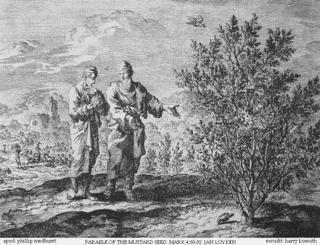Related Research Articles

Matthew 3:2 is the second verse of the third chapter of the Gospel of Matthew in the New Testament. John the Baptist has been introduced in the first verse and this verse describes the message that he is preaching. Through John's message, Matthew introduces the "Kingdom of Heaven".

Matthew 3 is the third chapter of the Gospel of Matthew in the New Testament. It is the first chapter dealing with the ministry of Jesus, with events taking place some three decades after the close of the infancy narrative related in the previous two chapters. The focus of this chapter is on the preaching of John the Baptist and the Baptism of Jesus.

Matthew 3:11 is the eleventh verse of the third chapter of the Gospel of Matthew in the New Testament. The verse occurs in the section relating the preachings of John the Baptist. In this verse he predicts that he will be followed by someone much greater than himself. The main theme of this verse is that John will soon be supplanted by a much greater figure and that John's water baptism is just a preparation for the much greater baptism by fire and spirit that will occur under the second coming of the Christian messiah Jesus, an original Christian concept that, according to Jewish scholars, lacks any fundament in the Hebrew scripture.

Matthew 4:17 is the seventeenth verse of the fourth chapter of the Gospel of Matthew in the New Testament of the Christian Bible. In the previous verses Jesus returned to Galilee after hearing of the arrest of John the Baptist and then left Nazareth for Capernaum. This verse reports that once in Capernaum, Jesus began to preach.

The Parable of the Mustard Seed is one of the shorter parables of Jesus. It appears in Matthew (13:31–32), Mark (4:30–32), and Luke (13:18–19). In the Gospels of Matthew and Luke, it is immediately followed by the Parable of the Leaven, which shares this parable's theme of the Kingdom of Heaven growing from small beginnings. It also appears in the non-canonical Gospel of Thomas.

The Parable of the Lost Sheep is one of the parables of Jesus. It appears in the Gospels of Matthew and Luke. It is about a shepherd who leaves his flock of ninety-nine sheep in order to find the one which is lost. It is the first member of a trilogy about redemption that Jesus tells after the Pharisees and religious leaders accuse him of welcoming and eating with "sinners."
Matthew 11:11 is the eleventh verse in the eleventh chapter of the Gospel of Matthew in the New Testament.
Matthew 11:13 is the thirteenth verse in the eleventh chapter of the Gospel of Matthew in the New Testament.

Matthew 7:21 is the twenty-first verse of the seventh chapter of the Gospel of Matthew in the New Testament and is part of the Sermon on the Mount. This verse continues Jesus' warning against false prophets.

Matthew 9:9 is the ninth verse in the ninth chapter of the Gospel of Matthew in the New Testament.
Matthew 9:10 is a verse in the ninth chapter of the Gospel of Matthew in the New Testament.
Matthew 11:1 is the first verse in the eleventh chapter of the Gospel of Matthew in the New Testament.
Matthew 11:10 is the tenth verse in the eleventh chapter of the Gospel of Matthew in the New Testament.
Matthew 9:11 is a verse in the ninth chapter of the Gospel of Matthew in the New Testament.
Matthew 9:13 is a verse in the ninth chapter of the Gospel of Matthew in the New Testament.
Matthew 11:19 is the nineteenth verse in the eleventh chapter of the Gospel of Matthew in the New Testament.
Matthew 12:28 is the 28th verse in the twelfth chapter of the Gospel of Matthew in the New Testament.

The Calling of Matthew is an episode in the life of Jesus which appears in all three synoptic gospels, Matthew 9:9–13, Mark 2:13–17 and Luke 5:27–28, and relates the initial encounter between Jesus and Matthew, the tax collector who became a disciple.

Matthew's gospel and Luke's gospel record Jesus' message of woe to the unrepentant cities of Chorazin, Bethsaida and Capernaum, located around the northern shore of the Sea of Galilee, for their refusal to repent.

This narrative is told in Matthew 9:10-17, Mark 2:15-22, and Luke 5:29-39. The Pharisee rebuke Jesus for eating with sinners, to which Jesus responds, "It is not the healthy who need a doctor, but the sick."
References
- ↑ Note on Luke 16 in CSB; Luke 16:16: Matthew 5:18; 11:12–13; 24:35 ; Mark 13:31
- ↑ Cornelius Cornelii a Lapide; Thomas Wimberly Mossman The great commentary of Cornelius à Lapide, London: J. Hodges, 1889-1896.
- ↑ John MacEvilly, An Exposition of the Gospel of St. John consisting of an analysis of each chapter and of a Commentary critical, exegetical, doctrinal and moral, Dublin Gill & Son 1879.
- 1 2 3 4 5 "Catena aurea: commentary on the four Gospels, collected out of the works of the Fathers: Volume 6, St. John. Oxford: Parker, 1874. Thomas Aquinas". 1874.
 This article incorporates text from this source, which is in the public domain .
This article incorporates text from this source, which is in the public domain .